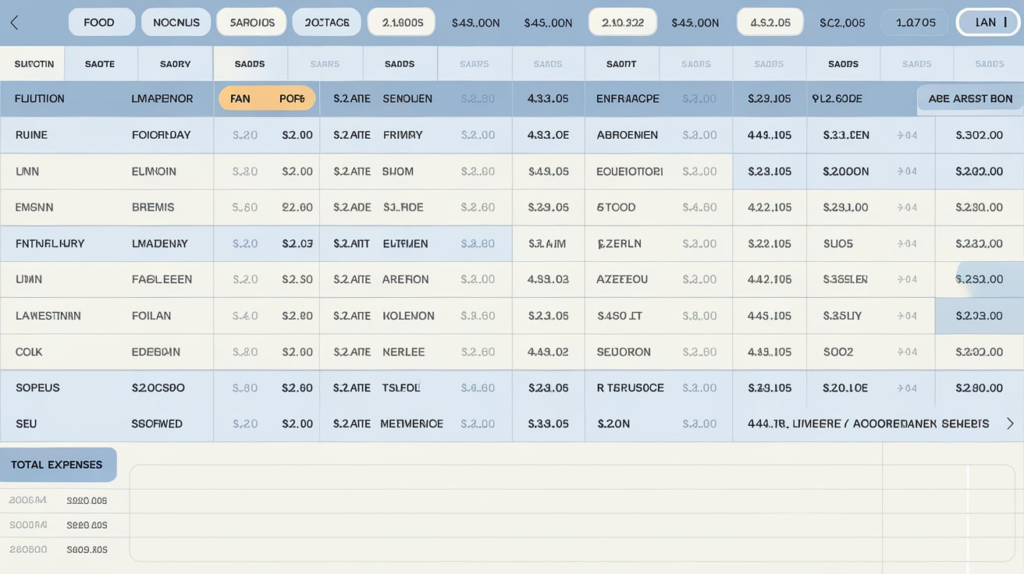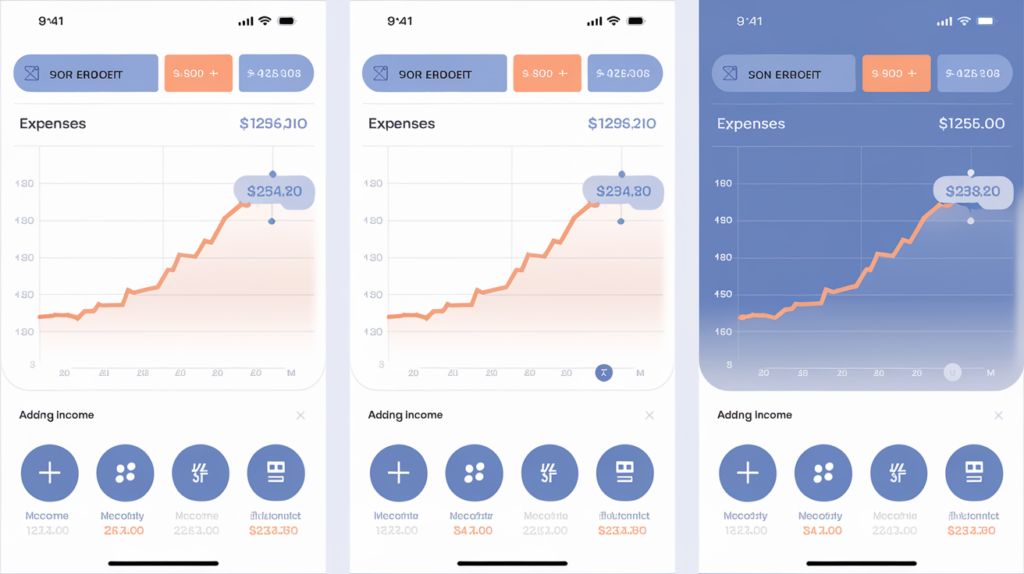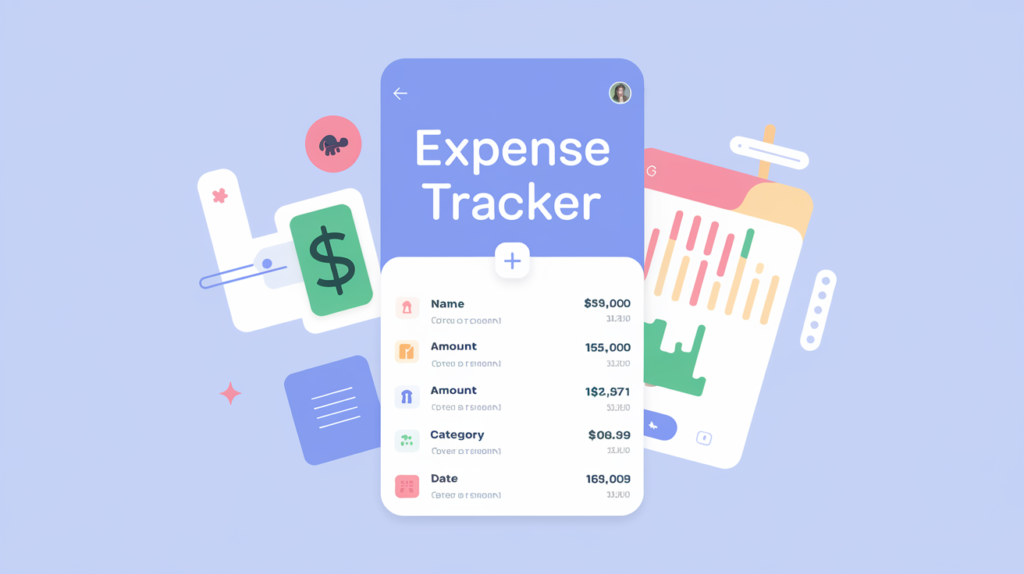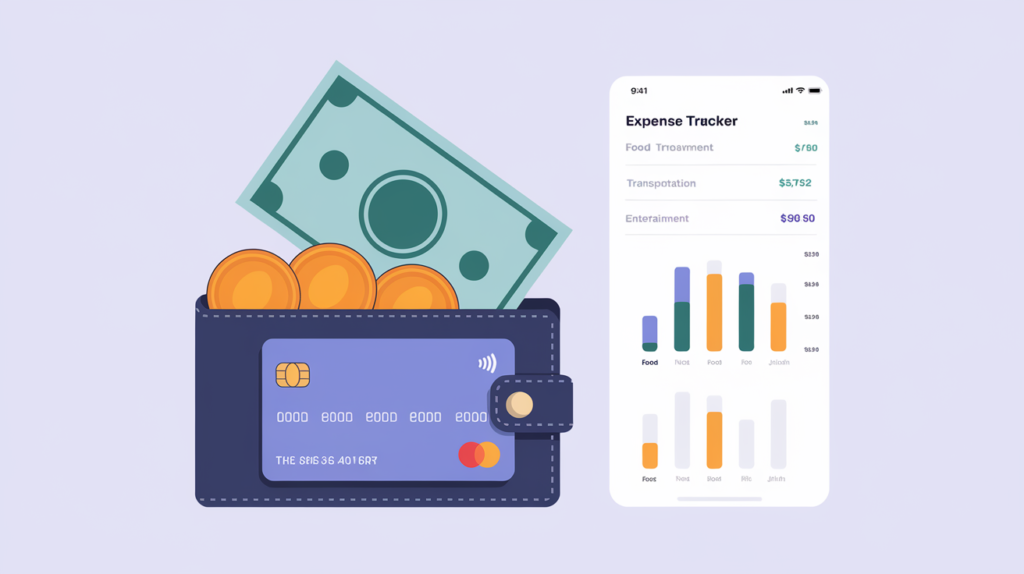Expense Tracker
Expenses
Summary
Total:
Track Your Spending: Easy Expense Tracker Solution
Managing your money starts with knowing how you spend it. This article will show you how an expense tracker can help. It’s great for cutting down on unnecessary spending, making a budget, or understanding your cash flow better.

By the end of this article, you’ll know how to use an expense tracker to improve your finances. We’ll cover everything from tracking your spending to making it a part of your daily life.
Key Takeaways
- Gain a clear understanding of your spending habits and financial behaviors
- Identify areas of unnecessary spending and opportunities for cost savings
- Develop a customized budget and achieve your financial objectives
- Automate the expense tracking process for a hassle-free experience
- Leverage data-driven insights to make informed financial decisions
The Importance of Tracking Your Expenses
Tracking your expenses is key to knowing your financial habits and reaching your goals. It helps you see where you can save money. This way, you can focus on what’s truly important to you.
Understanding Your Financial Habits
An expense tracker shows you how you spend money. It lets you see where you might be spending too much. This helps you plan your budget better.
Achieving Financial Goals
An expense tracker also tracks your progress towards your goals. Whether it’s saving for a house, paying off debt, or building an emergency fund. It helps you manage your money wisely.
“Tracking your expenses is the first step towards taking control of your financial future.”
Using an expense tracker daily helps you understand your spending. It lets you make changes to reach your financial goals.
What is an Expense Tracker?
An expense tracker is a tool for managing your money. It’s usually a software or spreadsheet to track your daily expenses. With an expense tracker, you can see where your money goes. This helps you make smart choices about your money management and cost tracking.
The main job of an expense tracker is to show you all your financial activities. You can list your expenses like rent, utilities, and groceries. It helps you spot where you might be spending too much and find ways to save.
Using an expense tracker can really change your financial life. It helps you understand your spending habits. This knowledge lets you plan your budget, save, and invest better. It’s a powerful way to take control of your money and secure your financial future.
| Features of an Expense Tracker | Benefits of Using an Expense Tracker |
|---|---|
| Categorization of expenses Tracking of income and spending Budgeting and goal-setting capabilities Visualization of spending patterns Integration with bank accounts and credit cards | Improved financial awareness Identification of unnecessary spending Ability to achieve financial goals Reduced stress and better money management Increased savings and reduced debt |
In short, an expense tracker is a key tool for managing your finances. It helps you understand your spending habits and cost tracking. This way, you can make smart choices, reach your financial goals, and have a healthier relationship with money.
Benefits of Using an Expense Tracker
Using an expense tracker can change how you manage your money. It gives you a clear view of your spending. This helps you make smart choices, set a budget, and focus on what’s important to you.
Gain Control Over Your Finances
An expense tracker shows you exactly how you spend your money. It helps you spot where you might be spending too much. This way, you can use your money wisely, reaching your goals without wasting it.
Identify Unnecessary Spending
Expense trackers reveal where you might be spending too much. They show you subscriptions, impulse buys, and other unnecessary costs. By knowing this, you can change your spending to save money for what really matters.

| Benefit | Description |
|---|---|
| Gain Control Over Finances | Provides a comprehensive overview of your spending habits, enabling you to make informed financial decisions and align your expenses with your goals. |
| Identify Unnecessary Spending | Helps you identify areas of excessive or impulse spending, allowing you to make adjustments and redirect funds towards your priorities. |
“Using an expense tracker has been a game-changer for my personal finances. It has helped me gain a better understanding of my spending patterns and make more mindful choices about where my money is going.”
Choosing the Right Expense Tracker
An expense tracker can change how you manage your money. But, with so many choices, picking the right one can be hard. To find the best expense tracker for you, look for certain key features.
Features to Look For
It’s important that the expense tracker is easy to use. It should be simple and quick to log your expenses. Also, having customizable categories is key. This lets you track your spending in a way that fits your habits.

Linking your expense tracker to your bank accounts can make things easier. It automatically adds and sorts your transactions. This saves time and helps keep your spending records accurate.
Being able to get detailed reports is another great feature. These reports show you where your money goes, helping you spend smarter. Look for a tracker that offers different types of reports, from simple to detailed.
The best expense tracker for you will depend on what you need and want. Take your time to look at different options. Make sure the features match your money management goals.
“An expense tracker is not just a tool, but a window into your financial habits. Choose wisely, and unlock the power to take control of your spending.”
The keywords “expense tracker,” “money management,” “cost tracking,” and “spending analysis” are used throughout the text. This makes the article more relevant for search engines without making it hard to read.
Setting Up Your Expense Tracker
Getting your finances in order can change your life. First, pick the right expense tracker for you. Then, organize your spending by categorizing your expenses. This helps you see where your money goes and make smart budget choices.
Categorizing Your Expenses
Sorting your expenses is key to using your expense tracker well. Grouping your spending into categories helps you understand your financial flow. Here are some common categories to start with:
- Housing (rent, mortgage, utilities)
- Transportation (car payments, gas, insurance, public transit)
- Groceries and Household Supplies
- Dining Out and Takeout
- Entertainment (subscriptions, streaming services, hobbies)
- Healthcare (insurance premiums, co-pays, medications)
- Personal Care (grooming, gym memberships)
- Miscellaneous (clothing, gifts, donations)
By sorting your spending, you can spot where you might be spending too much. This lets you adjust your budgeting and spending habits to save money. It also helps you track your progress towards your financial goals.
| Expense Category | Amount Spent |
|---|---|
| Housing | $1,500 |
| Transportation | $400 |
| Groceries and Household Supplies | $600 |
| Dining Out and Takeout | $300 |
| Entertainment | $150 |
| Healthcare | $250 |
| Personal Care | $100 |
| Miscellaneous | $200 |
By setting up your expense tracker and sorting your spending, you’re on the path to financial control. You’ll make better choices about how you spend your money.
Expense Tracker
An expense tracker is a powerful tool that helps you manage your finances. It gives you a place to record and organize your daily expenses. By logging your transactions, you can understand your spending habits better and make smart financial choices.
Effective expense tracking is key to good money management. It lets you:
- See where your money goes
- Spot unnecessary or too much spending
- Make a budget and follow it
- Track your progress towards financial goals
Whether you like digital apps or paper systems, the important thing is to find an expense tracker that suits you. Look for features like:
- An easy-to-use interface
- Automatic categorization of transactions
- Real-time spending analysis and reports
- Linking with your bank accounts and credit cards
Using an expense tracker regularly can change your financial life. It helps you understand your spending and make choices based on data. This way, you can manage your money better and reach your goals with confidence.
Developing Healthy Spending Habits
Mastering your finances is a journey. Creating a budget is a key step. An expense tracker helps you understand your spending. This lets you make better financial choices.

Creating a Budget
Budgeting is key to financial stability. An expense tracker shows where you spend too much. This helps you manage your money better and reach your goals.
- Categorize your expenses: Organize your spending into categories like housing, transportation, groceries, and entertainment. This helps you see where your money goes.
- Set spending limits: Create a budget for each category based on your income and goals. This keeps your spending in check.
- Prioritize your goals: Make sure your spending matches your priorities. Whether it’s saving for a house, paying off debt, or building an emergency fund, align your spending with your goals.
- Adjust as needed: Check your budget regularly and make changes as your finances or goals change.
By using budgeting and expense tracking, you can improve your spending habits. This puts you in control of your financial future.
Automating Your Expense Tracking
In today’s digital world, managing your money is easier than ever. Many expense tracker apps and tools can connect with your bank accounts and credit cards. This makes cost tracking and spending analysis faster and more accurate. It saves you time and keeps your money management up to date.
Automating your expense tracker brings many benefits:
- It cuts down on manual data entry, reducing errors and missed expenses.
- It gives you a live view of your spending, helping you manage your financial habits.
- It automatically sorts your expenses, making it easier to spot trends and save money.
- It works well with budgeting and goal-setting tools, helping you reach your financial goals.
To use this feature, find expense tracker apps or software that sync with banks and credit cards easily. This ensures your cost tracking is thorough and correct. It helps you make smart choices about spending and saving.
| Feature | Benefit |
|---|---|
| Automatic bank/credit card sync | Eliminates manual data entry, reduces errors, and provides real-time spending data |
| Automated expense categorization | Simplifies analysis and identification of spending patterns |
| Integration with budgeting tools | Helps you align your financial habits with your financial goals |
By using automation, you can better manage your spending analysis and make smart money choices. This leads to a more secure financial future.
Analyzing Your Spending Data
The expense tracker you’ve been using is more than just a tool to log your daily expenses. It’s a treasure trove of insightful data. This data can help you analyze your spending patterns and make informed financial decisions. By closely examining this data, you can identify trends that reveal valuable insights about your money management habits.
Identifying Trends
One of the key benefits of using an expense tracker is the ability to spot spending patterns over time. Start by reviewing your spending analysis to uncover areas where you may be overspending or opportunities to optimize your money management strategies. Consider the following trends:
- Monthly or seasonal fluctuations in your spending
- Categories where you consistently spend the most or least
- Changes in your spending habits over time, such as increased or decreased discretionary spending
- Differences between your actual spending and your budgeted amounts
By identifying these trends, you can make targeted adjustments to your financial planning and budgeting. This helps you achieve your long-term financial goals more effectively.
| Spending Category | Monthly Average | Percentage of Total Spending |
|---|---|---|
| Rent/Mortgage | $1,500 | 35% |
| Groceries | $500 | 12% |
| Utilities | $250 | 6% |
| Transportation | $300 | 7% |
| Dining Out | $200 | 5% |
| Entertainment | $150 | 4% |
| Other | $800 | 19% |
By closely analyzing your spending data, you can gain valuable insights. These insights help you make informed decisions. This way, you can optimize your financial planning and achieve your long-term goals.
Integrating Expense Tracking with Financial Goals
Expense tracking and financial planning are closely linked. By linking your expense tracking to your financial goals, you can align your spending with your dreams. This approach helps you make smart money choices and manage your finances better.
One big advantage is finding ways to save for your goals. Maybe you’re spending too much in some areas. An expense tracker can show you where to cut back and save for retirement or debt repayment.
Tracking your expenses also helps you make a budget that fits your goals. Knowing where your money goes lets you spend wisely. This discipline can help you reach big goals like saving for a house, funding your kid’s education, or building an emergency fund.
“Integrating your expense tracking with your financial goals is the key to maximizing the benefits of using an expense tracker. Every dollar you spend should be moving you closer to the financial future you envision.”
To link your expense tracking and financial planning, follow these steps:
- Review your financial goals: Clearly define your short-term and long-term objectives, such as debt reduction, savings, or investments.
- Categorize your expenses: Organize your spending into categories that align with your financial goals, making it easier to identify areas for improvement.
- Set spending limits: Establish spending limits for each category that support your goals, and use your expense tracker to monitor your progress.
- Adjust as needed: Regularly review your expense tracking and financial plan, making adjustments as your priorities or circumstances change.
By combining your expense tracker, financial planning, budgeting, and money management efforts, you can create a strong plan. This plan will help you reach your financial dreams. The insights you gain will guide you in making smart financial decisions.
Tips for Successful Expense Tracking
Keeping an accurate expense tracker is key to managing your money well. It helps you reach your financial goals. Here are some tips to make your expense tracking successful:
- Regularly Review Your Spending Data: Spend time each week or month to look at your spending. This helps you find ways to save and make better budget choices.
- Set Spending Limits: Create spending limits for things like groceries, fun, or travel. Sticking to these limits helps you avoid spending too much.
- Automate the Tracking Process: Use budgeting and spending habits apps or link your bank accounts. This makes tracking easier and keeps your data current.
- Regularly Review and Adjust Your Budget: Change your budget when your money situation or goals shift. This keeps your expense tracker working for you.
Follow these tips to get better at expense tracking. You’ll be on your way to better money management and financial health.
| Tip | Description |
|---|---|
| Regular Review | Analyze your spending patterns weekly or monthly to identify areas for improvement. |
| Set Spending Limits | Establish spending limits for various expense categories to avoid overspending. |
| Automate Tracking | Use budgeting apps or integrate bank accounts to streamline the tracking process. |
| Adjust Budget | Review and update your budget as your financial situation or priorities change. |
“Successful expense tracking is the foundation for building a solid financial future.”
Conclusion
Using an expense tracker is a key step towards financial freedom. It helps you understand your spending and make smart budget choices. This way, you can manage your money better and feel more secure.
Starting your financial journey is easy with an expense tracker. It shows you where your money goes and helps you spend wisely. This knowledge lets you save more and reach your financial dreams.
An expense tracker is essential for many financial goals. It helps you pay off debt, save for emergencies, or invest for the future. Stay focused and committed to your goals. With an expense tracker, you’re on the path to a better financial future.
FAQ
What is an expense tracker?
An expense tracker is a tool, like software or a spreadsheet, for tracking your daily spending. It helps you see where your money goes. This way, you can make smart choices about your budget.
What are the benefits of using an expense tracker?
An expense tracker gives you control over your money. It shows you where you spend too much. This lets you save for important goals instead.
What features should I look for in an expense tracker?
Look for ease of use, customizable categories, and bank account integration. Also, check if it can make detailed reports. These features help you manage your money better.
How do I set up my expense tracker?
First, pick your expense tracker. Then, set it up by organizing your spending. This makes it easy to spot trends and plan your budget.
How can I develop healthy spending habits with an expense tracker?
An expense tracker helps you spend wisely by showing you where your money goes. This way, you can plan your spending better and reach your financial goals.
How can I automate my expense tracking?
Many trackers sync with your bank accounts and cards. This makes tracking your spending easy and keeps your data up-to-date.
How can I analyze my spending data?
Your tracker’s data can show you where to cut back. By looking at your spending, you can adjust your budget. This helps you reach your financial goals.
How can I integrate my expense tracking with my financial goals?
Link your spending to your financial goals. This ensures every dollar you spend helps you achieve your future plans.
What tips can I use for successful expense tracking?
For success, regularly check your spending, set limits, and automate tracking. These steps keep you on track with your financial goals.